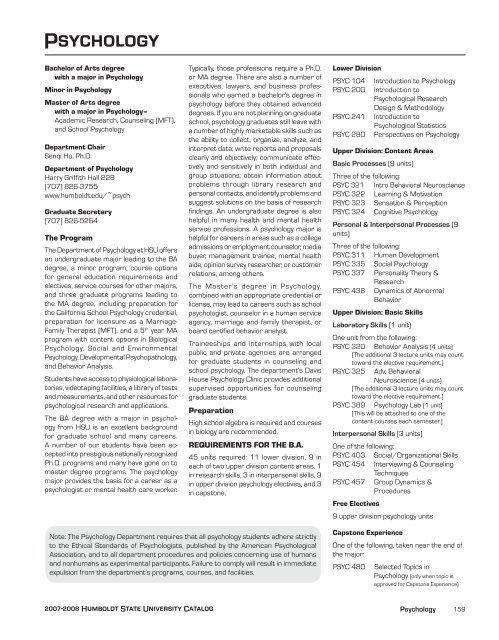2007-08 Academic Year - Humboldt State University
2007-08 Academic Year - Humboldt State University
2007-08 Academic Year - Humboldt State University
You also want an ePaper? Increase the reach of your titles
YUMPU automatically turns print PDFs into web optimized ePapers that Google loves.
Psychology<br />
Bachelor of Arts degree<br />
with a major in Psychology<br />
Minor in Psychology<br />
Master of Arts degree<br />
with a major in Psychology–<br />
<strong>Academic</strong> Research, Counseling (MFT),<br />
and School Psychology<br />
Department Chair<br />
Senqi Hu, Ph.D.<br />
Department of Psychology<br />
Harry Griffith Hall 228<br />
(707) 826-3755<br />
www.humboldt.edu/~psych<br />
Graduate Secretary<br />
(707) 826-5264<br />
The Program<br />
The Department of Psychology at HSU offers<br />
an undergraduate major leading to the BA<br />
degree, a minor program, course options<br />
for general education requirements and<br />
electives, service courses for other majors,<br />
and three graduate programs leading to<br />
the MA degree, including preparation for<br />
the California School Psychology credential,<br />
preparation for licensure as a Marriage-<br />
Family Therapist (MFT), and a 5 th year MA<br />
program with content options in Biological<br />
Psychology, Social and Environmental<br />
Psychology, Developmental Psychopathology,<br />
and Behavior Analysis.<br />
Students have access to physiological laboratories,<br />
videotaping facilities, a library of tests<br />
and measurements, and other resources for<br />
psychological research and applications.<br />
The BA degree with a major in psychology<br />
from HSU is an excellent background<br />
for graduate school and many careers.<br />
A number of our students have been accepted<br />
into prestigious nationally recognized<br />
Ph.D. programs and many have gone on to<br />
master degree programs. The psychology<br />
major provides the basis for a career as a<br />
psychologist or mental health care worker.<br />
Typically, those professions require a Ph.D.<br />
or MA degree. There are also a number of<br />
executives, lawyers, and business professionals<br />
who earned a bachelor’s degree in<br />
psychology before they obtained advanced<br />
degrees. If you are not planning on graduate<br />
school, psychology graduates still leave with<br />
a number of highly marketable skills such as<br />
the ability to collect, organize, analyze, and<br />
interpret data; write reports and proposals<br />
clearly and objectively; communicate effectively<br />
and sensitively in both individual and<br />
group situations; obtain information about<br />
problems through library research and<br />
personal contacts, and identify problems and<br />
suggest solutions on the basis of research<br />
findings. An undergraduate degree is also<br />
helpful in many health and mental health<br />
service professions. A psychology major is<br />
helpful for careers in areas such as a college<br />
admissions or employment counselor, media<br />
buyer, management trainee, mental health<br />
aide, opinion survey researcher, or customer<br />
relations, among others.<br />
The Master’s degree in Psychology,<br />
combined with an appropriate credential or<br />
license, may lead to careers such as school<br />
psychologist, counselor in a human service<br />
agency, marriage and family therapist, or<br />
board certified behavior analyst.<br />
Traineeships and internships with local<br />
public and private agencies are arranged<br />
for graduate students in counseling and<br />
school psychology. The department’s Davis<br />
House Psychology Clinic provides additional<br />
supervised opportunities for counseling<br />
graduate students.<br />
Preparation<br />
High school algebra is required and courses<br />
in biology are recommended.<br />
REQUIREMENTS FOR THE B.A.<br />
45 units required: 11 lower division, 9 in<br />
each of two upper division content areas, 1<br />
in research skills, 3 in interpersonal skills, 9<br />
in upper division psychology electives, and 3<br />
in capstone.<br />
Lower Division<br />
PSYC 104 Introduction to Psychology<br />
PSYC 200 Introduction to<br />
Psychological Research<br />
Design & Methodology<br />
PSYC 241 Introduction to<br />
Psychological Statistics<br />
PSYC 280 Perspectives on Psychology<br />
Upper Division: Content Areas<br />
Basic Processes (9 units)<br />
Three of the following:<br />
PSYC 321 Intro Behavioral Neuroscience<br />
PSYC 322 Learning & Motivation<br />
PSYC 323 Sensation & Perception<br />
PSYC 324 Cognitive Psychology<br />
Personal & Interpersonal Processes (9<br />
units)<br />
Three of the following:<br />
PSYC 311 Human Development<br />
PSYC 335 Social Psychology<br />
PSYC 337 Personality Theory &<br />
Research<br />
PSYC 438 Dynamics of Abnormal<br />
Behavior<br />
Upper Division: Basic Skills<br />
Laboratory Skills (1 unit)<br />
One unit from the following:<br />
PSYC 320 Behavior Analysis (4 units)<br />
[The additional 3 lecture units may count<br />
toward the elective requirement.]<br />
PSYC 325 Adv. Behavioral<br />
Neuroscience (4 units)<br />
[The additional 3 lecture units may count<br />
toward the elective requirement.]<br />
PSYC 389 Psychology Lab (1 unit)<br />
[This will be attached to one of the<br />
content courses each semester.]<br />
Interpersonal Skills (3 units)<br />
One of the following:<br />
PSYC 403 Social/Organizational Skills<br />
PSYC 454 Interviewing & Counseling<br />
Techniques<br />
PSYC 457 Group Dynamics &<br />
Procedures<br />
Free Electives<br />
9 upper division psychology units<br />
Note: The Psychology Department requires that all psychology students adhere strictly<br />
to the Ethical Standards of Psychologists, published by the American Psychological<br />
Association, and to all department procedures and policies concerning use of humans<br />
and nonhumans as experimental participants. Failure to comply will result in immediate<br />
expulsion from the department’s programs, courses, and facilities.<br />
Capstone Experience<br />
One of the following, taken near the end of<br />
the major:<br />
PSYC 480 Selected Topics in<br />
Psychology (only when topic is<br />
approved for Capstone Experience)<br />
<strong>2007</strong>-20<strong>08</strong> <strong>Humboldt</strong> <strong>State</strong> <strong>University</strong> Catalog Psychology<br />
159
















